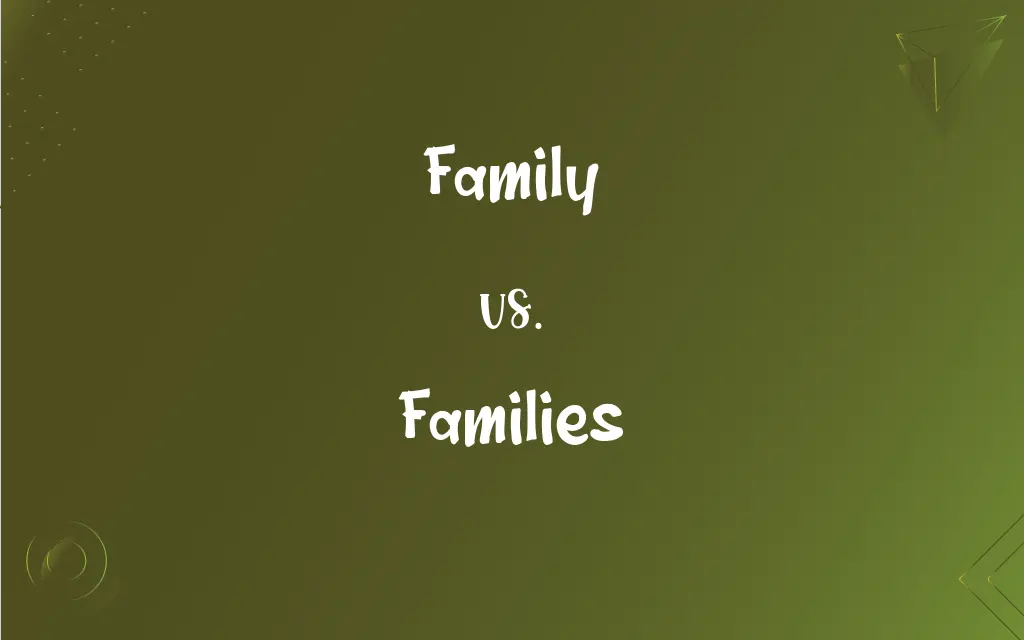Family vs. Families: What's the Difference?
Edited by Janet White || By Harlon Moss || Updated on October 9, 2023
"Family" refers to a single unit of individuals related by blood, marriage, or adoption. "Families" is the plural form, indicating more than one such unit.

Key Differences
"Family" is a noun that represents a group of individuals, either related by blood, marriage, or adoption, who share a common household or lineage. "Families," on the other hand, signifies more than one group of related individuals. Each word, although closely related, marks a distinction in number: one versus multiple.
Within the word "family," we denote a single unit or group that can be immediate (parents and their children) or extended (including aunts, uncles, and grandparents). The word "families" collectively refers to several of these units, acknowledging multiple separate entities that each represent a familial group.
It’s crucial to note the grammatical importance in selecting "family" or "families" in a sentence. "Family" is singular and would be used with singular verbs and singular pronouns, for example, “My family is large.” "Families," being plural, would be paired with plural verbs and pronouns, such as “Many families live in this neighborhood.”
Contextual use of "family" often signifies a single group or a specific unit’s experience or characteristics. Using "families" broadens that scope, generalizing or making statements that imply multiple groups, indicating variety and multiplicity in the scenario or characteristic being described.
Comparison Chart
Number
Singular
Plural
ADVERTISEMENT
Example Sentence
My family is going on vacation.
Many families enjoy summer vacations.
Usage with Verbs
Used with singular verbs (e.g., is, goes).
Used with plural verbs (e.g., are, go).
Connotation
Refers to one specific group of related people
Refers to multiple groups of related people.
Possessive Form
Family’s (e.g., My family’s home is large.)
Families’ (e.g., The families’ coats are wet.)
Family and Families Definitions
Family
A family consists of parents and their children, often living together.
The family enjoyed their weekend outing in the park.
ADVERTISEMENT
Families
Families can refer to several groups of objects classified under a shared category or type.
These plant families are often found in tropical regions.
Family
Family can also imply a category in scientific classification (taxonomy).
The lion belongs to the family Felidae, known for its carnivorous members.
Families
Families denotes multiple groups each consisting of parents and children.
Families in the neighborhood often gather for an annual picnic.
Family
Family also refers to all the descendants of a common ancestor.
The Windsor family has a long history in English royalty.
Families
Families may indicate numerous lineages or ancestries.
Royal families of Europe have intermingled histories and alliances.
Family
The term family can denote a group of related things or beings.
The rose family includes various plants like strawberries and cherries.
Families
Families in taxonomy point to multiple categories within a specific class or order.
Different families of bacteria have distinct characteristics and structures.
Family
Family, in a social context, can suggest a supportive group, not always related by blood.
Many consider their close friends to be family.
Families
Families, in societal terms, implies various groups offering support or shared objectives.
Supportive families in the community actively engage in local events.
Family
A fundamental social group in society typically consisting of one or two parents and their children.
Families
A fundamental social group in society typically consisting of one or two parents and their children.
Family
The children of one of these groups
She raised a large family.
FAQs
What does "families" mean?
"Families" is the plural form of "family," indicating multiple such groups.
Can "family" refer to items or entities?
Yes, "family" can refer to a group of related items, like a family of languages or plants.
When do I use "family" in a sentence?
Use "family" when referring to a single unit of related individuals.
Does "family" always mean biological relation?
No, "family" can also refer to close bonds or relationships, not just biological ones.
Can "family" refer to a criminal organization?
Yes, "family" can colloquially refer to a criminal organization, e.g., a mafia family.
Does “family” always indicate a legal or formal relationship?
No, “family” can also describe informal, chosen relationships and bonds.
What does "family" refer to?
"Family" refers to a group of individuals related by blood, marriage, or adoption.
What is the plural possessive form of "families"?
"Families'" (e.g., The families' reunion was held at a park.)
Does “family” indicate a singular or plural concept?
“Family” refers to a singular concept, indicating one group of related individuals.
When is "families" used?
"Families" is used to denote more than one family unit.
What is a singular possessive form for "family"?
"Family's" (e.g., My family's tradition is to cook together.)
Can "families" indicate distinct types or classes in a broader category?
Yes, "families" can refer to various types within a general category.
Can "families" indicate different models or types in products?
Yes, "families" can refer to various models or types within a product line.
Can “families” indicate diverse sociological or cultural groups?
Yes, “families” can refer to various societal or cultural groups sharing specific attributes or characteristics.
Is "families" used in scientific classification?
Yes, "families" can refer to multiple taxonomic units in biology, for instance.
Can "families" refer to unrelated groups?
Yes, "families" can denote groups sharing common objectives or characteristics without being related.
Can “family” denote a specific group in society?
Yes, it might refer to a singular entity or group within a society or context.
Can “families” imply historical or ancestral lineages?
Yes, “families” may refer to multiple ancestral lines or pedigrees.
How do you use "families" in a sentence?
"Families" is used with plural verbs, e.g., "Families across the world have diverse traditions."
Is "family" always used in a positive context?
No, "family" is neutral and can be used in diverse contexts, positive, negative, or neutral.
About Author
Written by
Harlon MossHarlon is a seasoned quality moderator and accomplished content writer for Difference Wiki. An alumnus of the prestigious University of California, he earned his degree in Computer Science. Leveraging his academic background, Harlon brings a meticulous and informed perspective to his work, ensuring content accuracy and excellence.
Edited by
Janet WhiteJanet White has been an esteemed writer and blogger for Difference Wiki. Holding a Master's degree in Science and Medical Journalism from the prestigious Boston University, she has consistently demonstrated her expertise and passion for her field. When she's not immersed in her work, Janet relishes her time exercising, delving into a good book, and cherishing moments with friends and family.































































